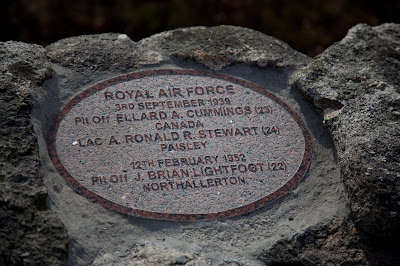In Flanders fields the poppies blow - By Duncan Harley
The Zulu wars were to take an awful
toll on Aberdeen’s Gordon Highlanders and in years to come, the young men of
the regiment were to be sacrificed on the poppy strewn plains of Europe not just
the once but twice more.
Miss Christie, as her pupils referred to her, seldom shared her feelings with her Dunnottar Primary class.
Miss Christie, as her pupils referred to her, seldom shared her feelings with her Dunnottar Primary class.
But her charges still recall her tears each year
when, on the anniversary of the death of a brother who perished amongst the
dense blue clay of Flanders fields, the entire class
would be asked to recite John McCrae’s poignant poem ‘In Flanders Fields.’
In Flanders fields the poppies blow
Between the crosses, row on row,
That mark our place; and in the sky
The larks, still bravely singing, fly
Scarce heard amid the guns below.
In Flanders fields the poppies blow
Between the crosses, row on row,
That mark our place; and in the sky
The larks, still bravely singing, fly
Scarce heard amid the guns below.
We are the Dead. Short days ago
We lived, felt dawn, saw sunset glow,
Loved and were loved, and now we lie,
In Flanders fields.
We lived, felt dawn, saw sunset glow,
Loved and were loved, and now we lie,
In Flanders fields.
Take up our quarrel with the foe:
To you from failing hands we throw
The torch; be yours to hold it high.
If ye break faith with us who die
To you from failing hands we throw
The torch; be yours to hold it high.
If ye break faith with us who die
We shall not sleep, though poppies grow
In Flanders fields.'
In Flanders fields.'
John McCrae of course had experienced the carnage at first hand. A
Canadian doctor and artillery commander, he penned the poem in memory of a dead
friend - Lieutenant Alexis Helmer, killed
on 2 May, 1915 in the gun positions near Ypres by counter-battery fire.
He made many revisions to the poetic lines and is said to have never been completely satisfied with the verses. Indeed, some reports suggest that he tried to destroy the writing only to have it rescued by a fellow soldier who had experienced the same suffering and loss.
Having almost survived the entirety of the war, Major McCrae died of meningitis in a military hospital in the French seaside resort of Wimereux in the January of 1918 perhaps unaware that his tribute to that dead comrade had become a propagandist national anthem for the selling of War Bonds.
Duncan Harley is author of The A-Z of Curious Aberdeenshire plus the forthcoming title: The Little History of Aberdeenshire - due out in March 2019
He made many revisions to the poetic lines and is said to have never been completely satisfied with the verses. Indeed, some reports suggest that he tried to destroy the writing only to have it rescued by a fellow soldier who had experienced the same suffering and loss.
Having almost survived the entirety of the war, Major McCrae died of meningitis in a military hospital in the French seaside resort of Wimereux in the January of 1918 perhaps unaware that his tribute to that dead comrade had become a propagandist national anthem for the selling of War Bonds.
Duncan Harley is author of The A-Z of Curious Aberdeenshire plus the forthcoming title: The Little History of Aberdeenshire - due out in March 2019











Comments
Post a Comment